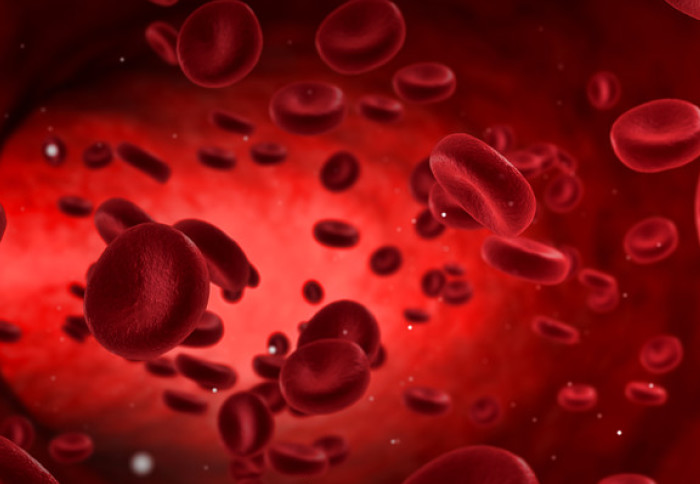Blood thinners may improve outcomes in 'moderately ill' COVID patients
by Ryan O'Hare

Treating less seriously ill COVID-19 patients with blood thinning drugs may help to reduce the need for vital organ support, a study has found.
This article was updated on 5th August 2021 to include publication details and additional quote.
The findings, which come from three large international clinical trials and published in the New England Journal of Medicine, show that full dose anti-coagulant treatments could reduce the requirement of vital organ support in non-critical patients hospitalized with COVID-19.
The latest results add to previous findings from the same arm of the studies, which found that anticoagulation therapy did not improve outcomes among critically ill patients with the disease.
According to the researchers, the latest findings show that the treatment is safe and beneficial in moderately ill patients, and may help to reduce the pressure in intensive care units in hospitals around the world.
Professor Anthony Gordon, Professor of Critical Care at Imperial College London, NIHR Research Professor and UK Chief Investigator for REMAP-CAP, said: “This new evidence from less severely ill patients, when combined with the previous results in critically ill patients, demonstrates the importance of evaluating treatments in randomised clinical trials. This is the only way to learn what are the right treatments but also ensure we treat the right patients at the right time.”
Three clinical trial platforms spanning five continents in over 300 hospitals, have been working together since May 2020 to urgently test whether there is a greater benefit of full doses of heparin (blood thinners) to treat adults hospitalized for non-critical COVID-19 illness compared to the lower dose typically administered to prevent blood clots in hospitalised patients.
'Moderately ill' patients
Based on the interim results of more than 1300 moderately ill patients admitted to hospital, findings showed that full doses of blood thinners were not only safe, but superior to the doses normally given to prevent blood clots in hospitalized patients.
Moderately ill patients are those not in ICU and who did not receive organ support such as mechanical ventilation at trial enrollment. The trial investigators are now working to make the full results of the study available so clinicians can make informed decisions about treating their COVID-19 patients.
This new evidence from less severely ill patients, when combined with the previous results in critically ill patients, demonstrates the importance of evaluating treatments in randomised clinical trials Professor Anthony Gordon Imperial College London
These trial results reported today complement the group’s findings announced in December that routine use of full-dose anti-coagulation when started in the ICU in critically ill COVID-19 patients was not beneficial and appeared to be harmful.
Dr Ryan Zarychanski, Associate professor, haematologist and critical care physician at the University of Manitoba, who is involved in both the ATTACC and REMAP-CAP trials, said:
“In a disease with a limited number of effective therapies, our results have the potential to define a new standard of care for moderately ill hospitalized COVID-19 patients around the world.”
Early in the pandemic, physicians around the world observed increased rates of blood clots and inflammation among COVID-19 patients which affected multiple organs and led to complications such as lung failure, heart attack and stroke. Whether providing increased doses of blood thinners routinely administered to hospitalised patients would be safe and effective was unknown at that time.
“These results are very exciting and lead us to better understand the impact of applying the right therapies at the right time in the course of this challenging disease,” said Dr Judith Hochman, NYU Grossman School of Medicine.
Clinical benefit
Knowing the effect of full dose blood thinners in hospitalised patients with non-critical disease was a key outstanding question that has now been answered. Most COVID-19 patients hospitalised are non-critical and this study will impact their care and outcomes. The multiplatform trial further paves the way for future collaborations on a global scale.
“These are the first multi-platform international clinical trials ever undertaken and given the rapid discovery of Heparin’s positive impact on patient outcomes during the middle of the deadly COVID-19 pandemic, I don’t think it will be the last time researchers, clinicians and patients join forces across continents to test potential treatments against any number of diseases,” said Dr Patrick Lawler, University of Toronto and co-principal investigator of ATTACC and a member of the international trial steering committee for REMAP-CAP.
The trials are supported by multiple international funding organizations including Canadian Institutes of Health Research (CAN), the LifeArc Foundation, the NIH National Heart, Lung & Blood Institute (US), National Institute for Health Research (UK), National Health and Medical Research Council (AUS), Health Research Council of New Zealand, and the PREPARE and RECOVER consortia (EU).
Professor Gordon added: “We were delighted to be able to play a leading role in these innovative, large scale clinical trials, to provide improved outcomes for patients with severe COVID-19.
“The research infrastructure we have built into the NHS, combined with the commitment from clinical teams and the patients who agree to take part has helped us tackle this pandemic as part of this international collaboration.”
-
'Therapeutic Anticoagulation with Heparin in Noncritically Ill Patients with Covid-19' by the ATTACC, ACTIV-4a, and REMAP-CAP Investigators, is published in NEJM. DOI:10.1056/NEJMoa2105911
The original article is based on materials from the University of Manitoba.
Article supporters
Article text (excluding photos or graphics) © Imperial College London.
Photos and graphics subject to third party copyright used with permission or © Imperial College London.
Reporter
Ryan O'Hare
Communications Division